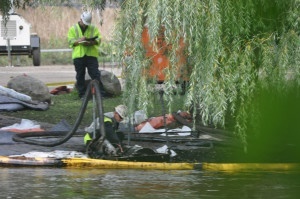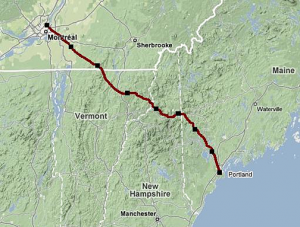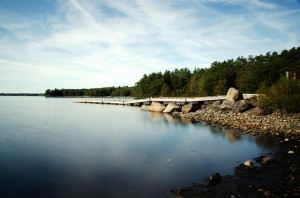We have much more to do and your continued support is needed now more than ever.
Speak Up Now! Help Stop Big Oil’s Tar Sands Agenda for New England
Tar sands—a dirty, sludgey oil being produced in Canada—may be oozing into the Northeast soon if Big Oil has its way. You might recognize this dirty product from the heated debate around the “Keystone XL” pipeline, which has received national focus in recent months. But if you thought tar sands were just a problem for the Midwest, think again.

Enbridge Inc.—which is known for its terrible safety record and is responsible for a massive tar sands spill in the Kalamazoo River in 2010—has asked the National Energy Board in Canada to allow for a partial reversal of its pipeline between Ontario and Montreal to allow oil in that pipeline to flow east. If this reversal is approved, it is highly likely Big Oil will soon seek to move tar sands through a pipeline that now flows west from Portland, ME to Montreal by reversing the flow of that pipeline as well.
Such a reversal, if approved, would open the way for this dangerous fuel, which is much more corrosive, acidic, and harder to clean up in the event of spill than conventional oil, to flow through Vermont, New Hampshire, and Maine. The pipeline (called the “Portland to Montreal Pipeline” or PMPL) currently cuts through or borders some of New England’s most important waters, including Sebago Lake, the Connecticut River, and tributaries to Lake Champlain. While its safety record isn’t as abysmal as other companies’, the PMPL has suffered major spills, including one that fouled Lake Memphremagog, and is already much older than the projected lifespan of proposed new tar sands pipelines.

But even as we take strides toward reducing global warming pollution, climatologists warn that tar sands are a carbon bomb in the process of being ignited. Because it takes so much energy to produce and refine, fueling cars with tar sands gasoline has about 20 percent more carbon emissions than fueling cars with gasoline from conventional oil. This means the use of tar sands will undermine any efforts in the Northeast to reduce carbon emissions from our transportation sector. Climate change threatens to make Vermont maple syrup and Maine lobsters things of the past. We need to turn to carbon-free sources of fuel now, not move in the opposite direction.

![]() Tell Canada’s National Energy Board to stop the Trailbreaker pipeline proposal!
Tell Canada’s National Energy Board to stop the Trailbreaker pipeline proposal!
To hear NWF’s Jim Murphy talk about tar sands’ threat to Northeastern states, click here.
Read more about our work to fight back against Big Oil’s tar sands scheme at nwf.org/tarsands.




















